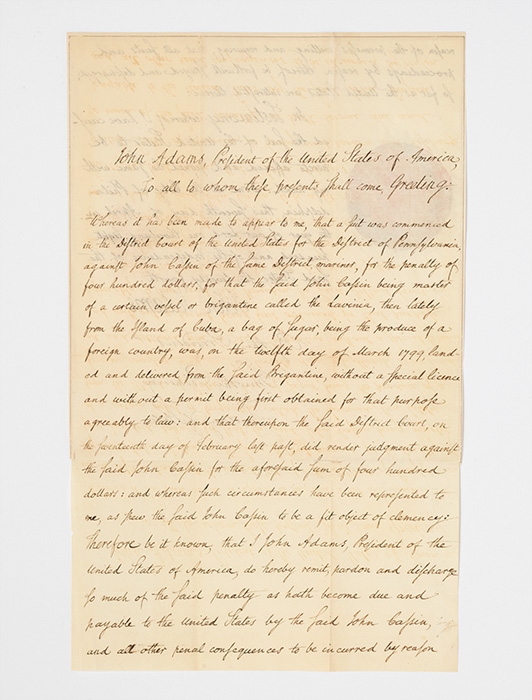
EXCEPTIONALLY RARE MANUSCRIPT PRESIDENTIAL PARDON, 1800, SIGNED BY JOHN ADAMS, DISCHARGING PROCEEDINGS AGAINST JOHN CASSIN, THE MASTER OF THE BRIGANTINE LAVINIA, FINED FOR SMUGGLING A BAG OF SUGAR FROM CUBA
ADAMS, John. Manuscript presidential pardon signed. Philadelphia, April 7, 1800. Single sheet of unlined paper, measuring 9 by 14-1/2 inches, with original paper seal, laid into narrow line border; pp. 2; matted and framed, showing original of page two with signatures, and facsimile of page one. Entire piece measures 29 by 16 inches. $19,500.
Extremely rare manuscript presidential pardon, dated April 7, 1800, pardoning John Cassin, the master of the Brigantine, for offenses related to the illegal importation of a bag of Cuban sugar at time when the United States was considering the acquisition of Cuba, signed by both John Adams and Secretary of State Timothy Pickering.
The manuscript pardon, written in a secretarial hand and signed by John Adams, reads in full: "John Adams, President of the United States of America, To all to whom these presents shall come, greeting: Whereas it has been made to appear to me, that a suit was commenced in the District Court of the United States for the District of Pennsylvania, against John Cassin of the same District, mariner, for the penalty of four hundred dollars, for that the said John Cassin being master of a certain vessel or brigantine called the Lavinia, then lately from the Island of Cuba, a bag of sugar, being the produce of a foreign country, was, on the twelfth day of March 1799, landed and delivered from the said Brigantine, without a special license and without a permit being first obtained for that purpose agreeable to law: and that thereupon the said District Court, on the seventeenth day of February last past, did render judgment against the said John Cassin for the aforesaid sum of four hundred dollars: and whereas such circumstances have been represented to me, as shew the said John Cassin to be a fit object of clemency: Therefore be it known, that I John Adams, President of the United States of America, do hereby remit, pardon and discharge so much of the said penalty as hath become due and payable to the United States by the said John Cassin, and all other penal consequences to be incurred by reason of the premises, willing and requiring, that all sits and proceedings by reason thereof be forthwith stayed and discharged so far as the United States are interested therein: In Testimony whereof I have caused the Seal of the United States to be hereto affixed and signed the same with my hand. Done at the City of Philadelphia, this seventh day of April in the year of our Lord one thousand eight hundred, and of the Independence of the said States the twenty fourth. [signed] John Adams By the President [signed] Timothy Pickering Secretary of State."
Given the extreme scarcity of Adams Presidential pardons, it may seem less than obvious that Cassins would be chosen as a recipient. However, despite the relative insignificance of his offense, Cassin had landed in the middle of an international relations fiasco. Cassin was the master of the Brigantine Lavinia out of Salem, Massachusetts. In 1796, the Lavinia was captured in Aux Cayes, Haiti and the cargo was condemned and sent to Cuba (then owned by Spain). Spain controlled Caribbean trading at that point in time and they forbade the islands to trade with foreign ships in the interest of preserving their monopoly.
Cuba, however, had been much ignored by Spanish administrators due to its lack of precious minerals. Its only notable natural resource was lumber, which the Spanish used for shipbuilding and repairs to the galleon fleets they used to ship colonial resources back to Spain biannually. Mostly, Cuba had strategic importance, as a way station between Spain and the colonies. Cuban residents eked out livings as small farmers and traded exclusively with the supply ships, who charged exorbitant prices for imports while underpaying for exports. Conditions in Cuba were tense.
There was, though, a single crop of great value just off Cuba's shores: sugar. Only a few years prior, Haiti had gone through a slave revolt and started the bloody process of transitioning from a French slave colony to the world's leading producer of sugar. Cubans took note of Haiti's success, began trying to throw off the mantle of slavery, and increased their own sugar production. Soon, Cuba overtook Haiti and became the leading exporter of sugar.
Cassin's 1796 capture came at a tumultuous time. Commercial relations had been ended between the United States and Spain following a slave revolt in Cuba, part of Cuba's long process of achieving abolition. During the years that followed, Spain would repeatedly open and close Cuban ports for trade, with trade immediately recommencing due to Americans' insatiable taste for sugar.
Additionally, Cuba had gained the notice of both the United States and Britain, both of whom were considering its acquisition. By the time Jefferson became President, Cuba was being so heavily considered for purchase that Jefferson stated to his successor Madison, "I candidly confess that I have ever looked upon Cuba as the most interesting addition that can be made to our system of States." He noted that with Cuba and Canada, the United States "could have such an empire for liberty as she has never surveyed since the creation." This item was bound into an extra-illustrated copy of the "History of the City of New York" circa 1872, in the possession of Emery E. Childs, and while the book—expanded to 21 volumes—has passed through several hands, this particular autograph letter has not been on the market since it was bound in, a happy circumstance that has also maintained this rare letter in excellent condition.
Signatures bold, paper seal intact, small closed tear along edge, slight area of faint offsetting to verso. About-fine condition.